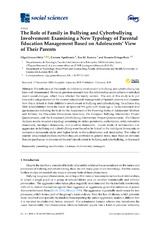The Role of Family in Bullying and Cyberbullying Involvement: Examining a New Typology of Parental Education Management Based on Adolescents’ View of Their Parents
Autor
Gómez Ortiz, Olga
Apolinario, Carmen
Romera Félix, Eva M.
Ortega Ruiz, Rosario
Editor
MDPIFecha
2019Materia
ParentingSocialization
Violence
Victimization
Teenagers
METS:
Mostrar el registro METSPREMIS:
Mostrar el registro PREMISMetadatos
Mostrar el registro completo del ítemResumen
The influence of the family in children’s involvement in bullying and cyberbullying has been well documented. However, previous research into this relationship seems to have overlooked recent social changes, which have affected the family context. The aim of this study is to put forward a categorization of the current educational management of Spanish parents and examine how this is linked to their children’s involvement in bullying and cyberbullying. To achieve this, 2060 schoolchildren from the South of Spain (47.9% girls with mean age = 14.34) answered four questionnaires including the Scale for the Assessment of the Parenting Styles of Adolescents’ Mothers and Fathers, the Discipline Dimensions Inventory, the European Bullying Intervention Project Questionnaire, and the European Cyberbullying Intervention Project Questionnaire. The Cluster Analysis results revealed a typology containing six styles: permissive, authoritarian, strict, normative democratic, indulgent democratic, and punitive democratic. Lower levels of victimization and aggression in bullying and cyberbullying were found to be linked to the indulgent democratic or normative democratic styles and higher levels to the authoritarian and strict styles. The value of parents’ educational practices and how they are combined in general styles, since these are elements that can predispose or prevent adolescent’s involvement in bullying and cyberbullying, is discussed.

